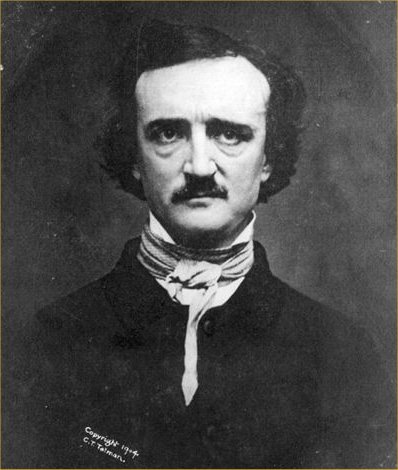The falling action of “Ligeia” focuses mainly on the message of the Joseph Glanvill quote and how the two characters Ligeia and Rowena represent different parts of the quote. “And the will therein lieth, which dieth not. Who knoweth the mysteries of the will, with its vigor? For God is but a great will pervading all things by nature of its intentness. Man doth not yieid himself to the angels, nor unto death utterly, save only throught weakness of his feeble will” (Joseph Glanvill). Ligeia’s connection to the Glanvill quote is Poe’s emphasis on Ligeia’s will to defy the inevitable to live beyond death and to not let man’s weakness of his feeble will overcome her. Glanvill states that because of nature, death is inevitable and since mortals aren’t angels, death will occur to every human. Despite the order of nature, God’s will, Ligeia persisted to avoid weakness of a feeble will that will lead one to death. Even after her death, her soul never crossed over into the afterworld. Her soul still lingered on in the real world; she appeared in the narrator’s hallucinations. Ligeia became a figment of the narrator’s imagination, a figment that ultimately let to a figment of reality when she rebirths. This gap that Ligeia lived in represented her strong will to live and how she refused to fully cross over into the afterworld and become permanently dead; she represented the opposite of the type of man Joseph Glanvill described. Unlike Ligeia, Rowena’s will to live was not strong, which eventually led to her death at the end of “Ligeia”. Rowena represented the type of man that exists, “Man doth not yield himself to the angels, nor unto death utterly, save only through the weakness of his feeble will.” The poison that led Rowena to permanent death was caused by her weakness of her feeble will. What also contributed to her death was the lack of affection the narrator had of Rowena; this was the example of a feeble will. Perhaps the reason why Ligeia’s will to live was so strong was because it was combined with the narrator’s love for her and Rowena’s feeble will was because she had no lover to live for. Edgar Allen Poe used a major Romantic theme in his “Ligeia”; he stressed the supernatural and how the main character, the narrator became confused between the supernatural and reality. The theme of the supernatural versus the reality completely overpowers the reader causing the reader to also doubt whether or not the narrator and Ligeia are reunited. The falling action of “Ligeia” is especially important because it ties the overall theme of Romanticism with the characters and the plot.
Tuesday, November 24, 2009
Falling Action
The falling action of “Ligeia” focuses mainly on the message of the Joseph Glanvill quote and how the two characters Ligeia and Rowena represent different parts of the quote. “And the will therein lieth, which dieth not. Who knoweth the mysteries of the will, with its vigor? For God is but a great will pervading all things by nature of its intentness. Man doth not yieid himself to the angels, nor unto death utterly, save only throught weakness of his feeble will” (Joseph Glanvill). Ligeia’s connection to the Glanvill quote is Poe’s emphasis on Ligeia’s will to defy the inevitable to live beyond death and to not let man’s weakness of his feeble will overcome her. Glanvill states that because of nature, death is inevitable and since mortals aren’t angels, death will occur to every human. Despite the order of nature, God’s will, Ligeia persisted to avoid weakness of a feeble will that will lead one to death. Even after her death, her soul never crossed over into the afterworld. Her soul still lingered on in the real world; she appeared in the narrator’s hallucinations. Ligeia became a figment of the narrator’s imagination, a figment that ultimately let to a figment of reality when she rebirths. This gap that Ligeia lived in represented her strong will to live and how she refused to fully cross over into the afterworld and become permanently dead; she represented the opposite of the type of man Joseph Glanvill described. Unlike Ligeia, Rowena’s will to live was not strong, which eventually led to her death at the end of “Ligeia”. Rowena represented the type of man that exists, “Man doth not yield himself to the angels, nor unto death utterly, save only through the weakness of his feeble will.” The poison that led Rowena to permanent death was caused by her weakness of her feeble will. What also contributed to her death was the lack of affection the narrator had of Rowena; this was the example of a feeble will. Perhaps the reason why Ligeia’s will to live was so strong was because it was combined with the narrator’s love for her and Rowena’s feeble will was because she had no lover to live for. Edgar Allen Poe used a major Romantic theme in his “Ligeia”; he stressed the supernatural and how the main character, the narrator became confused between the supernatural and reality. The theme of the supernatural versus the reality completely overpowers the reader causing the reader to also doubt whether or not the narrator and Ligeia are reunited. The falling action of “Ligeia” is especially important because it ties the overall theme of Romanticism with the characters and the plot.
Subscribe to:
Post Comments (Atom)

No comments:
Post a Comment